 Bounded Rationality and Industrial Organization
Bounded Rationality and Industrial Organization
Bounded Rationality
and Industrial
Organization
Ran Spiegler


Oxford University Press, Inc., publishes works that further
Oxford Universitys objective of excellence
in research, scholarship, and education.
Oxford New York
Auckland Cape Town Dar es Salaam Hong Kong Karachi
Kuala Lumpur Madrid Melbourne Mexico City Nairobi
New Delhi Shanghai Taipei Toronto
With offices in
Argentina Austria Brazil Chile Czech Republic France Greece
Guatemala Hungary Italy Japan Poland Portugal Singapore
South Korea Switzerland Thailand Turkey Ukraine Vietnam
Copyright 2011 by Oxford University Press
Published by Oxford University Press, Inc.
198 Madison Avenue, New York, New York 10016
www.oup.com
Oxford is a registered trademark of Oxford University Press
All rights reserved. No part of this publication may be reproduced,
stored in a retrieval system, or transmitted, in any form or by any means,
electronic, mechanical, photocopying, recording, or otherwise,
without the prior permission of Oxford University Press.
Library of Congress Cataloging-in-Publication Data
Spiegler, Ran.
Bounded rationality and industrial organization / Ran Spiegler.
p. cm.
Includes bibliographical references and index.
ISBN 978-0-19-539871-7 (cloth : alk. paper)
1. Consumer behavior. 2. Decision making. 3. Consumption
(Economics)Psychological aspects. 4. Industrial organization
(Economic theory) I. Title.
HF5415.32.S67 2011
658.8342dc22 2010015046
1 3 5 7 9 8 6 4 2
Printed in the United States of America
on acid-free paper
 CONTENTS
CONTENTS PREFACE
PREFACEThis book summarizes and synthesizes recent developments in the theory of Industrial Organization that incorporate departures from the standard model of consumer behavior in the direction of a richer psychology. It cannot be denied that the challenge of enriching the psychology of decision makers in economic models has been at the very frontier of theoretical research in the last decade, given an enormous boost by the behavioral economics movement.
However, while the subject has given rise to a large and varied literature that includes numerous research articles as well as a number of surveys and anthologies, one can think of very few proper textbooks that could serve a graduate-level course in economic theory. Indeed, the most recent theory-oriented textbook of any relevance that I am aware of is Ariel Rubinsteins 1998 Modeling Bounded Rationality, which preceded many of the developments that caused such a stir in our profession. This book aims to narrow this gap, albeit in the very specific domain of industrial organization.
The book is meant to serve as a textbook for graduate courses in microeconomic theory, as well as theory-oriented courses in industrial organization or behavioral economics. It is partly based on lecture notes from courses given at Tel Aviv University, University College London and the Helsinki Center of Economic Research. In the course of writing this book, I have greatly benefitted from financial support by the European Research Council and the ESRC (UK). Parts of the research it is based on were supported by BSF and ISF grants.
I wish to thank several colleagues who gave comments on earlier drafts of book chapters: Eddie Dekel, Kfir Eliaz, Susana Esteban, Ignacio Esponda, Erik Eyster, Yves Guron, Michael Grubb, Paul Heidhues, Philippe Jehiel, Barton Lipman, Marco Mariotti, Erik Mohlin, Michele Piccione, Jidong Zhou, and especially Ayala Arad for her consistently superb feedback. I am hugely indebted to Ariel Rubinstein, who not only contributed concrete suggestions that helped me improve the exposition and proofs of several results, but also provided valuable encouragement throughout this project. Ariel got me hooked on the subject of bounded rationality fifteen years ago, and I have continued to benefit from his work and his thoughts ever since. Ayala Arad and Yves Guron have provided truly spectacular research assistance. In particular, Yves helped typesetting the manuscript and wrote the solution manual. I am forever grateful to both. My coauthors, Kfir Eliaz and Michele Piccione, deserve some of the credit for the material in the book, as our joint work has formed the basis of several chapters. The Oxford University Press editors, Terry Vaughn and Joe Jackson, provided warm and reliable support. Finally, I wish to thank the composer Steve Reich, whose music provided an indispensable soundtrack for the writing process. If the book feels monotonous or repetitive at times, blame it on him.
 Bounded Rationality and Industrial Organization
Bounded Rationality and Industrial Organization
Introduction
Consider the following market situations you may have encountered as a consumer:
You receive an invitation to accept a new credit card. You are reluctant to accept it because you are concerned that, armed with this new credit card, you will be tempted to spend more than you wish.
You consider acquiring a new service at what seems like an attractive price. You suspect, however, that you may be unaware of certain future contingencies that will make it considerably more expensive than you can estimate at present.
You try to choose a mutual fund from a vast array of market options, and you find the task of evaluating and comparing the numerous alternatives daunting. It is not that you lack information. On the contrary, information is superabundant, and it overwhelms you.
You have spent the last hour reading the latest telephone bill, and you are still trying to figure out how the bottom line was reached.
You listen to a sales pitch / watch a TV commercial / stare at the package of a product, and although these have no informational content, you feel more willing to consider buying the product.
These situations should be familiar to most members of an advanced economy. However, they present the modern economic theorist with a dilemma. Does conventional economic theory offer adequate tools for making sense of these situations and their welfare implications, or do we need new modeling tools? This book springs from the belief that the latter is true. In each of the above situations, there is an aspect of consumer psychology that takes the situation outside the scope of standard economic theory. My objective in this book is to present and synthesize recent theoretical research that has tried to formalize some of these aspects of decision making and examine their implications for market interactionsspecifically, for the subfield of microeconomic theory that studies individual markets, namely Industrial Organization (henceforth I.O.).
The theory of I.O. has been developed in several major waves. The first wave involved the formulation of basic models of market structure (particularly perfect competition and monopoly). The second and third waves came more or less simultaneously in the 1970s. One wave saw the introduction of Game Theory into I.O., enabling thorough exploration of static and dynamic models of oligopoly. The other incorporated asymmetric information into I.O. models. Economists have come to realize that informational asymmetries constitute a major source of market friction, and that certain market and non-market institutions may be explained as responses to this market failure.
Next page

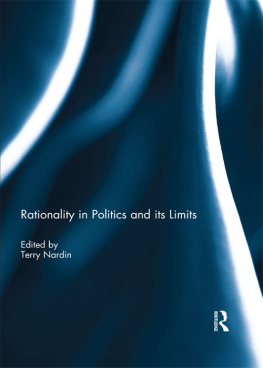
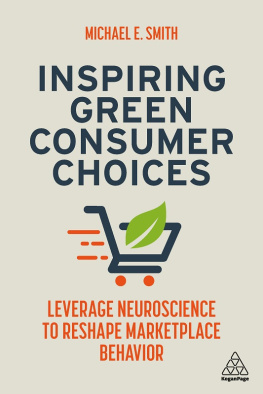
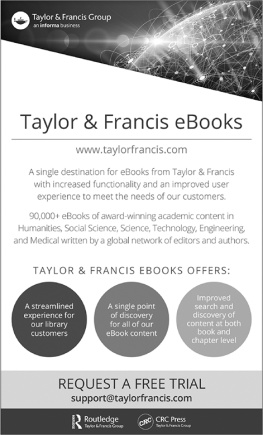
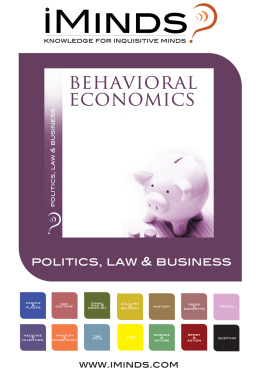
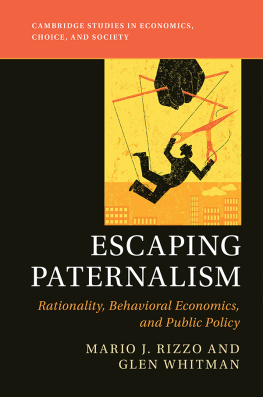
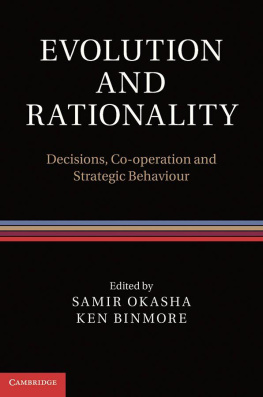

 Bounded Rationality and Industrial Organization
Bounded Rationality and Industrial Organization

 CONTENTS
CONTENTS